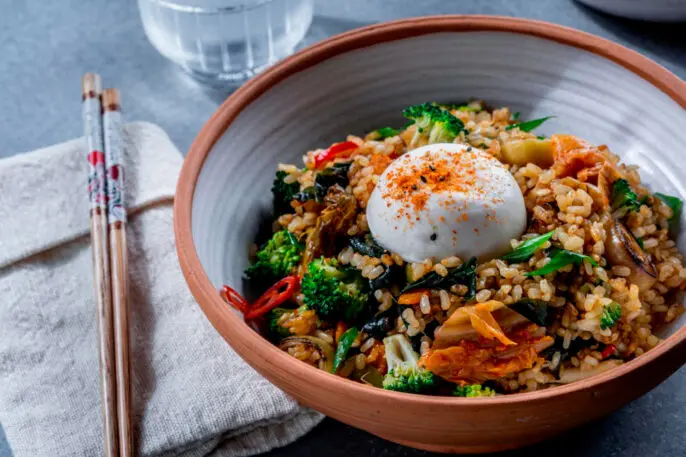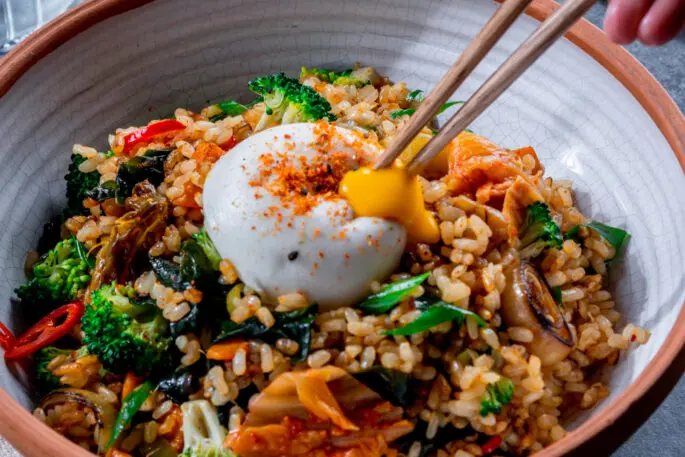In front of me is a poached egg. When I press my knife into its white, rounded top, it gives slightly before splitting and oozing out a golden-hued, runny yolk. The yolk is velvety and rich; the white of the egg is firm but not rubbery. It tastes like a classic poached egg—but it didn’t come from a chicken. It’s made entirely out of plant-based ingredients.
The poached egg is from Israeli company Yo Egg, and it’s making its U.S. debut this week in a handful of Los Angeles restaurants. Made primarily out of chickpea and soy protein (along with sunflower oil, potato starch, water, and a few other ingredients), the egg is a first for the plant-based market, according to the company. So far, egg alternatives have been primarily in powder or liquid form, but Yo Egg provides what the company calls a “whole egg experience.”
The product was created by chef Yosefa Ben Cohen. Yo Egg cofounder and CEO Eran Groner (formerly with food-tech company Future Meat) explains that the impetus was when Cohen was hired by a popular restaurant chain in Israel to develop a vegan sunny-side-up egg. “People started coming to that place asking for just the egg,” he says, which at that time was made out of tofu and pumpkin. “So she realized that there’s a huge market demand for the egg experience—not just the functionality of eggs like powders or liquid to get the binding effect or to make scrambled eggs.”

When Groner tried the product, he was in. Before entering the alt-meat space, he worked with chicken farms, which he describes as a highly complex business. “This product tastes just like an egg. It looks like an egg. The texture and flavor and color, everything is just like an egg. The animal is a middleman that we don’t really need,” he says. “It only adds complexity.”

Cohen and Groner—together with Cohen’s husband, Nisim Ben Cohen, who serves as COO—incorporated Yo Egg in late 2021. By May 2022, they secured $5 million in seed funding, led by Stray Dog Capital and NFX. In Israel, Yo Egg makes both poached and sunny-side-up versions of vegan eggs. It launched in a nationwide breakfast chain called Benedict—an intentional choice, Groner says. “We launched our product in the best brunch places in Israel, not vegan at all, because our goal is to really make a difference and have an impact.” Yo Egg is also being served in the corporate campus kitchens of Google and Facebook in Israel, and in some hotels there.
The company has an Israeli-based production factory, and recently opened another in Los Angeles with the capacity to produce “thousands of eggs every day,” Groner says. This week, Yo Egg’s poached egg is debuting on menus at six Los Angeles restaurants), including Real Food Daily, Swingers Diner, and Flore Vegan. The Yo Egg poached eggs can be as versatile as the real thing; Real Food Daily said it’s using them on avocado toast, eggs Benedict, and as add-ons for several dishes, including ramen.
Groner says Yo Egg’s stateside launch in Los Angeles is strategic, noting it’s one of the most progressive markets in the U.S. for plant-based food. “We thought if we’re here to conquer brunch and breakfast and to own that space, then L.A. is probably the best place to start,” he says.
Groner can’t reveal the manufacturing process for the plant-based eggs, or how that perfect runny yolk is achieved—the company developed proprietary equipment and a proprietary process to master that feat, and is in the process of patenting the equipment—but does say Yo Egg has scaled up its culinary practices in a way that allows for mass production, and for real competition with chicken eggs. For chefs in its partner restaurants and kitchens, making Yo Eggs is easy: They just need to be boiled; and it’s not possible to overcook them.
That scale is key to Yo Egg’s goal to be the “world’s largest egg manufacturer” (that its offerings are “plant based” is beside the point, Groner says). The company says it’s already at price parity with premium eggs, and aims to reach price parity with traditional eggs within the next few years. Yo Egg is debuting in the U.S. at a time when egg prices are making headlines across the country, partly because of disease outbreaks among flocks; the avian flu has killed tens of millions of chickens.

Yo Egg’s poached eggs aren’t at risk of such animal-borne diseases. “We don’t have to worry about viruses and bacteria infecting our flocks,” Groner says. That’s one advantage of the product, he says, along with the fact that it has a smaller environmental impact. It takes 53 gallons of water to make one chicken egg, and though Yo Egg hasn’t concluded a certified assessment yet, it estimates that it takes 90% less water to manufacture its product.
“It will work in our benefit to remove the animals from the food system,” Groner says. “Because then we won’t see price hikes, we’ll use way less natural resources, and we’ll minimize the use of antibiotics and the danger of animal-borne diseases.”
After the launch of Yo Egg’s poached eggs in the U.S., the company will introduce its sunny-side-up eggs here as well. The company is also working to produce vegan hard-boiled and over-hard eggs, as well as scrambled eggs and omelets. Although Yo Egg products are available only in restaurants, hotels, and corporate kitchens to start, the company has its sights set on reaching customers through grocery stores and other food service establishments across the U.S.
There’s no timeline on that yet, but Groner points out that in less than a year from seed funding, the company has two products and two factories and has launched in two markets. “For us, that’s very important because, yeah, all startups need to execute and be fast,” he says, “but if we’re going to be a dominant force in the egg industry, we have to be as efficient as an egg company.”
Recognize your brand’s excellence by applying to this year’s Brands That Matter Awards before the early-rate deadline, May 3.
